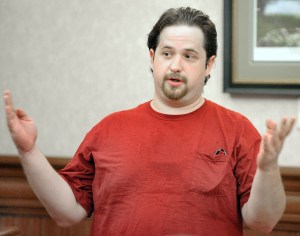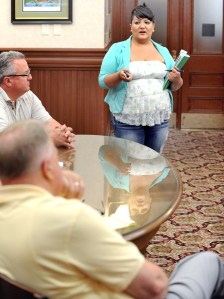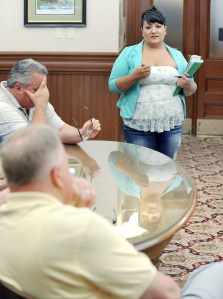City officials complained about tight budgets that make it hard to inspect downtown apartments and respond to tenant complaints, and about an economic situation that’s far more complex and difficult to solve than the tenants allow.
But both sides in the City Council Chamber of City Hall agreed on one thing: more money could be spent to fix Lewiston’s downtown housing.
“It’s not a simple issue,” Gil Arsenault, Lewiston’s director of Planning Code Enforcement, said. “It’s not just the landlords and it’s not just the tenant. It’s a litany of issues.”
Members of the city’s Neighborhood Housing League met with Mayor Robert Macdonald and the city’s code enforcement staff for almost two hours Monday in an intense discussion that occasionally turned into a debate.
“I have seen full rehabilitation projects done in this community and a year later the building is uninhabitable,” Arsenault said. “The condemned buildings, by and large, were reasonable buildings until the landlord got so jammed financially that they couldn’t do what they needed to do and they walked away. The next thing you know, that building is being stripped of copper and destroyed.”
Melissa Dunn, resident coordinator for the league, said the meeting was called to let tenants tell the mayor and city officials what they were seeing in their neighborhoods.
Shawn Simard, 27, said he was evicted from his Bartlett Street apartment after he complained about bed bugs and a broken stove.
Paul Nickerson, 35, complained that fire officials helping with housing inspections might not be certified housing inspectors. Ray Polley said inspectors frequently miss problems with the buildings.
“Mr. Mayor, I think you ought to send your code enforcement people to school,” Polley said.
Arsenault said his staff is educated, trained and certified and they work hard. The problem is, there are three of them and they are trying to do the work of six.
“We are never going to get to everything,” Arsenault said. “We just do not have the overtime budget. It means that when you call because you have no heat, we are going to deal with that call. Something has to give. We try to handle all the calls but not everything is going to make it.”
Dunn pushed Arsenault and the city to agree to fine every landlord whenever a code violation is found, but Arsenault would not. He said there’s little point in fining a landlord that is on the verge of bankruptcy. And sometimes, a fine could be the last step that pushes a landlord into walking away from a building, leaving tenants homeless.
Jeff Baril, the city’s police and code enforcement liaison, said that was the situation last winter. A landlord, faced with a city fine and court case, said he would walk away from the building. That would have forced the eviction of all the landlord’s tenants — 75 families, in the middle of the winter. The city held off on issuing a fine.
“Instead, we worked with him until the spring,” Baril said. “It was more of a controlled landing instead of crash.”
But Arsenault said tenants need to tell the city when there are problems. If they see code issues, they should call his office. If they see fire dangers and broken smoke alarms, they should call the Fire Department. And if they feel their landlord is retaliating, they should call an attorney.
“It does me no good if you are talking amongst ourselves,” Arsenault said. “If you have an issue, you have to call. And if it doesn’t get corrected you have to call again.”
One woman asked if tenants could volunteer to help his office. It might be better if they’d volunteer to help their neighborhood, Arsenault said.
“We’d love to see volunteers in the downtown,” Arsenault said. “Police your own neighborhood. Pick the trash up in your neighborhood. Talk to your landlord and have him give you some paint and paintbrushes and paint the porches. There is so much people can do.”






Comments are no longer available on this story